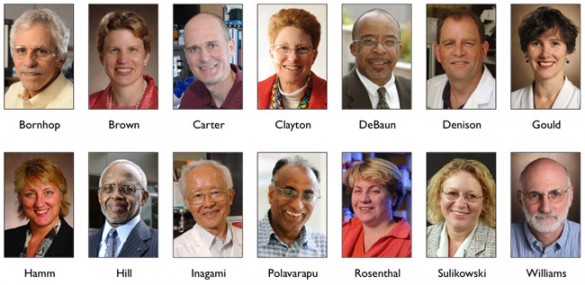 Seventeen members of Vanderbilt University’s faculty have been elected fellows of the American Association for the Advancement of Science (AAAS) this year.
Seventeen members of Vanderbilt University’s faculty have been elected fellows of the American Association for the Advancement of Science (AAAS) this year.
This is the largest number of Vanderbilt fellows to be elected in a single year on record.
They are among 702 fellows from around the country selected by their peers because of their “scientifically or socially distinguished efforts to advance science or its applications.”
The new fellows will be recognized on Feb. 16 at the 2013 AAAS annual meeting in Boston.
Vanderbilt University now has 80 AAAS fellows among its current and emeritus faculty. Thirty eight of them have been elected in the last three years.
“We are very proud of the great work of these outstanding faculty colleagues through their research, teaching and mentoring,” said Richard McCarty, Ph.D., Vanderbilt University provost, vice chancellor for Academic Affairs and professor of Psychology. “This special recognition by AAAS is fitting tribute to them and reflects well on the University.”
“The election of a record 17 faculty as new fellows offers further validation of the University’s significant advancements to medicine and science,” said Jeff Balser, M.D., Ph.D., vice chancellor for Health Affairs and dean of the Vanderbilt University School of Medicine. “We celebrate the recognition of these individuals by the AAAS while recognizing the important contributions they bring to their respective fields.”
The new fellows and their achievements are:
Michael Aschner, Ph.D., professor of Pediatrics and Pharmacology, and Gray E. B. Stahlman Chair in Neurosciences
For distinguished contributions to the field of toxicology, particularly research on the mechanisms of metal in induced neurotoxicity.
Albert Beth, Ph.D., professor of Molecular Physiology and Biophysics
For the development of high resolution spin label probes and for their utilization in determining the dynamics and structure of membrane proteins.
Richard Caprioli, Ph.D., Stanford Moore Chair in Biochemistry and director of the Mass Spectrometry Research Center
For distinguished research in the fields of chemistry and biochemistry, for seminal advances in mass spectrometry and innovation in imaging/profiling mass spectrometry (IMS).
Roger Chalkley, D.Phil., professor of Molecular Physiology and Biophysics and senior associate dean for Biomedical Research Education and Training
For distinguished contributions to studies of chromatin structure and regulation of gene expression, and for extraordinary leadership in graduate education in the biomedical sciences.
Robert Coffey Jr., M.D., Ingram Professor of Cancer Research
For distinguished contributions to the study of growth factor signaling in intestinal cell biology and neoplasia and in the pathogenesis and treatment of Ménétrier’s disease.
Roger Cone, Ph.D., chair, Department of Molecular Physiology and Biophysics and Joe C. Davis Chair in Biomedical Science
For distinguished contributions in cloning and characterizing the melanocortin receptors and discovering the role of the CNS melanocortin system in the regulation of body weight.
P. Jeffrey Conn, Ph.D., Lee E. Limbird Chair in Pharmacology and director, Vanderbilt Center for Neuroscience Drug Discovery
For distinguished contributions in improving our understanding of metabotropic glutamate and muscarinic receptors in brain function and their modulation for the treatment of CNS disorders.
Eric Delpire, Ph.D., professor of Anesthesiology and of Molecular Physiology and Biophysics
For distinguished contributions to the field of cellular and molecular physiology, especially for the function and regulation of cation-chloride cotransporters.
Ronald Emeson, Ph.D., Joel G. Hardman Chair in Pharmacology
For distinguished contributions to the field of RNA processing in the nervous system, and for leadership in neuroscience at Vanderbilt University.
David Harrison, M.D., Betty and Jack Bailey Chair in Cardiology and director, Division of Clinical Pharmacology and Vanderbilt Vascular Biology Center
For distinguished contributions to vascular biology and hypertension, particularly for studies of radicals in vascular cells and elucidating the role of adaptive immunity in hypertension.
Hassane Mchaourab, Ph.D., professor of Molecular Physiology and Biophysics
For pioneering contributions to the development of biological electron paramagnetic resonance (EPR) spectroscopy and to membrane protein structural biology.
Jennifer Pietenpol, Ph.D., Benjamin F. Byrd Jr. Endowed Chair in Oncology and director, Vanderbilt-Ingram Cancer Center
For outstanding contributions to the field of cancer research, particularly the involvement of signaling networks in breast and other cancers.
Dan Roden, M.D., assistant vice chancellor for Personalized Medicine, and William Stokes Chair in Experimental Therapeutics
For distinguished contributions to elucidating molecular and genetic mechanisms of drug-induced cardiac arrhythmias, and for pioneering efforts in pharmacogenomics that enable personalized medicine.
Keivan Guadalupe Stassun, Ph.D., professor of Astronomy and co-director, Fisk-Vanderbilt Masters-to-Ph.D. Bridge Program
For fundamental contributions to the study of young stars and brown dwarfs, and for major efforts to promote the participation of underrepresented minorities in science.
William Tansey, Ph.D., Ingram Professor of Cancer Research and professor of Cell and Developmental Biology
For pioneering discoveries that revealed connections between the transcription and ubiquitin systems, including critical advances in understanding the functions of ubiquitin and proteasome in gene expression.
Sten Vermund, M.D., Ph.D., Amos Christie Chair in Global Health and director, Vanderbilt Institute for Global Health
For leadership, vision and research achievement in the prevention of HIV and in the special needs of HIV-infected women.
Christopher V. Wright, D.Phil., professor of Cell and Developmental Biology, and Louis B. McGavock Chair
For distinguished contributions to the field of developmental biology and genetics, particularly for seminal discoveries in pancreas organogenesis and embryonic body patterning.
For more information on AAAS Fellows, see http://www.aaas.org/aboutaaas/fellows/.















